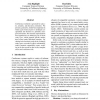Free Online Productivity Tools
i2Speak
i2Symbol
i2OCR
iTex2Img
iWeb2Print
iWeb2Shot
i2Type
iPdf2Split
iPdf2Merge
i2Bopomofo
i2Arabic
i2Style
i2Image
i2PDF
iLatex2Rtf
Sci2ools
111
click to vote
NAACL
2010
2010
Coreference Resolution in a Modular, Entity-Centered Model
Coreference resolution is governed by syntactic, semantic, and discourse constraints. We present a generative, model-based approach in which each of these factors is modularly encapsulated and learned in a primarily unsupervised manner. Our semantic representation first hypothesizes an underlying set of latent entity types, which generate specific entities that in turn render individual mentions. By lexical statistics at the level of abstract entity types, our model is able to substantially reduce semantic compatibility errors, resulting in the best results to date on the complete end-to-end coreference task.
Computational Linguistics | Entity Types | Latent Entity Types | NAACL 2010 | Semantic Compatibility Errors |
| Added | 14 Feb 2011 |
| Updated | 14 Feb 2011 |
| Type | Journal |
| Year | 2010 |
| Where | NAACL |
| Authors | Aria Haghighi, Dan Klein |
Comments (0)

